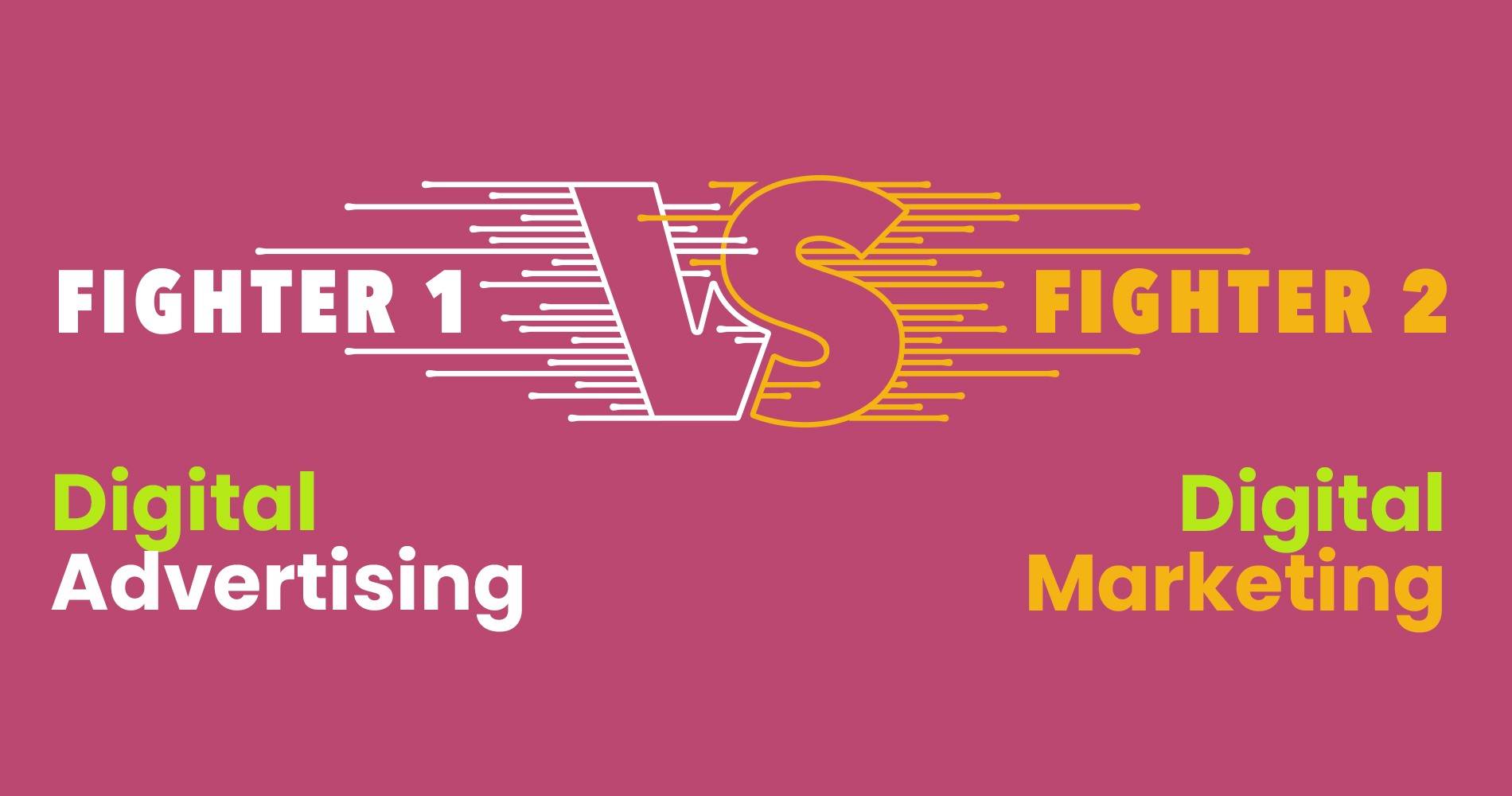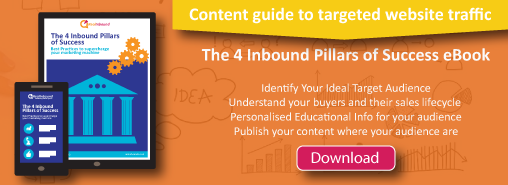Today businesses are vying for the attention of consumers with various forms of marketing. The question is... to get the right message across effectively to the right people, so that they understand and engage with it, which techniques and approach should you use?
Would it be better to go with marketing or advertising?
Let’s take a look at the definition of each term. Marketing tends to focus more on the marketability of a product and its ability to reach an audience; whereas advertising tends to be geared towards driving traffic, leads and sales by promoting a brand or company through various media channels.
Digital Advertising
Digital advertising – also known as online advertising, web advertising, or internet advertisements, is a mechanism for marketing and advertisement in which consumers and businesses use the Internet to receive promotional advertisements from companies, organisations, and individuals.
Digital advertising encompasses the use of digital services to promote your product or service and ultimately grow your business reach. Digital advertising can be broken down into three stages. The first stage is called "Attention". Where digital advertising achieves this stage by capturing the attention of users and engaging them with their content – whether it's a video, social media post, banner, etc., that relates to their brand. The second stage is called "Consideration." Here digital advertisers will aim to develop a marketing message that informs consumers about the problem solved by their product or service and why they should purchase it. Lastly, we have the last stage called "Conversion".
Once you've reached this phase you want consumers to purchase your product or service based on all of the thinking that has gone into selling it including pricing strategies and how their company treats its customers (the Digital Advertising Agency will help with this).
Digital Advertising Further Breaks Down into Three Different Types:
1. Pay-per-click (PPC) ads
A PPC campaign is simply a matter of purchasing clicks per search term. People who do this type of buying are known as advertisers who may be competing against you for those same phrases and terms. It may seem like a good idea, but in most cases, it's not. Because they generally pay more than what you'll get on your regularly scheduled organic listing.
2. Display ads:
Display advertising is a way of attracting people’s attention to something in the real or online world. It is used to spread information about products or services, endorse certain ideas, and much more. Display advertising can be done in many ways some of which include — text-based, image, or video ads that encourage a person to click through to the landing page and complete their action.
3. Social ads:
Social media advertising, or social media targeting, is one of the best ways to reach your target market after generating a list of people you'd like to reach on social networks. This type of marketing works because it's all about following who your target audience interacts with on sites such as Facebook and Twitter.
By working closely with social networking sites and their advertising departments, brands can create ads that reach all sorts of demographics from tens of thousands at a time scooping up data from anything from age ranges to interests related to topics such as lifestyles and gender. If done correctly, this form of advertising allows for highly targeted individuals who may be more likely to interact with your brand if you know what aspects are distinctly unique to your business. Your target market will notice relevant advertisements that speak directly to them resulting in greater engagement and interest towards a specific
Digital Marketing
Digital marketing is all about online presence. Businesses leverage online channels to reach and connect with their customers, like email newsletters, social media, blog posts, logos, or anything else that can be branded. Promoting your business online will make it easy for you to keep in touch with your clients because everything from your products or services to deals or company info can be distributed quickly and easily via digital platforms and reach anybody who has the internet.
There are six types of digital marketing:
- SEO (search engine optimisation)
- SMM (Social Media Marketing)
- Content Marketing
- Mobile and email marketing
- Affiliate Marketing
- Internet advertising
In general, Digital marketing is a collection of channels used to contact digital audiences with the goal being conversion. It can include displaying ads for consumers within screens on platforms like search engine results, email, and social media. Digital marketing also includes targeting people based on demographic information such as age, location, and parental status. In addition to different methods of reaching their target market, digital marketers are now using virtual reality to create engaging content to capture their target audience's attention.
Marketers are especially eager to measure the performance of their campaigns and advertising. Measuring digital marketing campaigns includes clicks, impressions, leads, and conversions. Working with digital as opposed to traditional media makes it much simpler than ever to track Return on Investment (ROI), helping marketers see the effectiveness of their efforts which helps them make better decisions that equate to ROI optimisation for their future. Also, thanks to tremendous amounts of targeting technologies and data in digital marketing marketers can reach target audiences without compromising scale - including being able to target specific attributes such as demographic, behavioral, psychographic, and more. Not only can marketers target a group of people they can also target individual users regardless of what device they may be using at the time a campaign is running.
Digital Advertising Is a Component of Digital Marketing
Digital marketing is a broader term whereas digital advertising is just a part of it. This raises a question, Is digital advertising necessary for your business?
Here’s the answer.
Although the definitions make it clear that digital advertising is a subset of digital marketing, the real focus of your strategy must happen before you begin paying to have your product showcased through advertisements. Engaging in activities such as product research, pricing and packaging are all a part of your marketing strategy and should be taken into consideration when creating a sales strategy for what could become profitable for you. Additionally, you also want to include factors related to promoting your product and deciding where you're going to place it to ensure maximum exposure will be gained for your new venture.
Some marketers sometimes make the mistake of viewing advertising as something that can be added to their business strategy and marketing mix in the same way one might add coffee or cream to a recipe. However, digital marketing goes far deeper than just monetising your website through ads. Authority marketers view it as a process for identifying the needs and wants of the consumer and adapting what they're offering around it for greater customer satisfaction based on in-depth market research.
Digital advertising is an element of the marketing mix. This digital media comes into play when you leverage the internet to market your product or service and generate traffic. However, you can opt for other tactics – search engine optimisation and social media management using Hootsuite come to mind, just to name a few.
Digital marketing is so important for a business, especially one that sells over the internet. This means you can run your enterprise without digital advertising but not digital marketing. You need to be able to generate leads and generate traffic or else you will find it nigh on impossible to compete with those who have taken advantage of this latest wave of technology!
An Advertisement Is a One-Time Action While a Marketing Campaign Is a Process
The following are ways in which digital marketing can be used to market your business:
- Establishing your target audience,
- Customer engagement, conversion, and retention strategies,
- Evaluating new and existing channels like SEO, PPC, content marketing, etc.
- Analysis and monitoring
Digitally marketing your business does not end with just one campaign, it's a continuous process that has no real final step. There is no specific data given from the refining stage that kicks off the whole process again. Rather, a new strategy evolves from existing information in an endless cycle.
In the digital marketing process, digital advertising is one of the activities. To drive traffic, you need to promote your primary digital identity (blog, website, app, product, etc.) via ads to relevant people. Digital marketers will need to provide input on what to promote, who to promote, advertising budget, etc., to help a digital advertiser make these decisions. In response, the advertiser will produce an advertisement designed to attract visitors.
Digital Marketing Is a Multi-Channel Marketing Method and Tactics May Vary as Per the Circumstance
Digital advertising or the promotion of a particular product or an offer to the audience through different digital media platforms, especially social media is tactical because it’s limited time. Anyone can throw together ads to promote their products on social channels today. And if they don’t, they may lose their lead on competitors who are more than eager to capitalise on any opportunity they can get. Digital marketing strategies are more effective because they have proven results, more reliable sources, and information available online that prove that these strategies are much more efficient at achieving targeted goals compared to just throwing ads up with some unrelated messaging attached to them.
An effective digital marketing plan shows results over an instant advertising campaign. If a digital marketing campaign fails, it will affect the profitability of a business to an extent. Not that profits aren't an important factor, but what we're trying to convey is if the digital advertising campaign fails it’s not the end of the world amongst everything else you have going on around your entrepreneur hustle such as creating a product or services and defining your niche after conducting market research.
Digital Advertising Helps Advertise the Brand, While Digital Marketing Helps It Gain Reputation
Digital advertising is used to create a connection between a brand, product, or service, and its audience. A compelling ad must grab a customer's attention in just seconds because an attractive image or catchy slogan can motivate customers to communicate further by getting in touch and asking questions.
Digital Marketing Is Sales-Centric but Digital Advertising Is Audience-Psychology Driven
Digital marketing is not always geared toward sales. A primary goal of digital marketing is to generate more revenue through audience awareness and traffic analysis, but that's not all. Digital marketing also involves building a relationship with your target audience via social media channels like Twitter, Facebook, LinkedIn on one hand or by developing an effective blog site, on the other hand, both aiming at bringing users back to your website regularly so they can appreciate its value over time.
You might consider writing a blog and publishing it both to increase traffic to your site and to cultivate relationships with your readers. Digital marketing operates according to audience psychology. Knowing the psychology of your target audience is essential for understanding their needs and wants.
On the contrary, digital marketing is simply a more cost-effective form of advertising because it is an indirect method to reach your customers.






